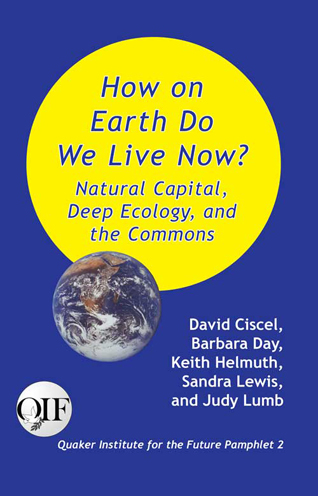How on Earth Do We Live Now? Natural Capital, Deep Ecology, and the Commons

![]() Available from Quakerbooks.org, Amazon.com, and Amazon.co.uk
Available from Quakerbooks.org, Amazon.com, and Amazon.co.uk
How on Earth Do We Live Now? Natural Capital, Deep Ecology, and the Commons was written by David Ciscel, Barbara Day, Keith Helmuth, Sandra Lewis, and Judy Lumb, and published for Quaker Institute for the Future by Producciones de la Hamaca, Caye Caulker, BELIZE - 80 pages (2009).
The natural capital and deep ecology approaches both address the question: “How on Earth do we live now?” Our high energy industrial economy is crashing into the reality of Earth’s ecology, and a massive environmental crisis is unfolding from this incoherent human-earth relationship. To explore these two world views, we asked David Ciscel to join the Quaker Eco-Bulletin editorial team in a Circle of Discernment under the Quaker Institute for the Future (QIF).
We explored the history and development of current public policies in regard to two essential parts of Earth’s commons: property and water, both of which require major changes in governance. We studied systems of governance from private property to self-governing community-based trust organizations and the nature of human behavior from individualistic to cooperative. We asked what unique contributions Friends bring to the table as we all face the realization of the enormity of the change that is needed for a sustainable and just human-earth relationship.
Quaker Institute for the Future Pamphlets aim to provide critical information and understanding born of careful discernment on social, economic, and ecological realities. Quaker Institute for the Future Pamphlets are inspired by the testimonies and values of the Religious Society of Friends (Quakers) and are based on a spiritual and ethical commitment to "right relationship" with Earth’s whole commonwealth of life. We live in a time when social and ecological issues are converging toward catastrophic breakdown. Human adaptation to social, economic and planetary realities must be re-thought and re-designed. Quaker Institute for the Future Pamphlets are dedicated to this calling and this task. The Quaker Institute for the Future (QIF) seeks to generate systematic insight, knowledge, and wisdom that can inform public policy and enable us to treat all humans, all communities of life, and the whole Earth as manifestations of the Divine. QIF creates the opportunity for Quaker scholars and practioners to apply the social and ecological intelligence of their disciplines within the context of Friends’ testimonies and the Quaker traditions of truth seeking and public service.
